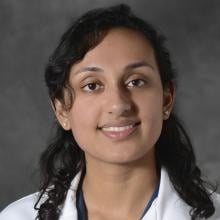As a medical student, do you ever wonder what it’s like to specialize in obesity medicine? Meet Farrah Hafeez, DO, a family and obesity medicine physician and a featured doctor in the AMA’s “Shadow Me” Specialty Series, which offers advice directly from physicians about life in their specialties. Check out her insights to help determine whether a career in obesity medicine might be a good fit for you.
The AMA Specialty Guide simplifies medical students’ specialty selection process, highlights major specialties, details training information, and provides access to related association information. It is produced by FREIDA™, the AMA Residency & Fellowship Database®.
Learn more with the AMA about the medical specialty of family medicine, which is where many obesity medicine specialists are board certified.
“Shadowing” Dr. Farrah Hafeez
Specialty: Family and obesity medicine.
Practice setting: Group practice.
Employment type: Employed by Henry Ford Health in Macomb County, Michigan. Henry Ford Health is a member of the AMA Health System Program, which provides enterprise solutions to equip leadership, physicians and care teams with resources to help drive the future of medicine.
Years in practice: 10.
A typical day and week in my practice: As a working mom, it is all about juggling the demands of home and work. On a typical day, I first focus my attention on my children, all three of whom are under the age of 4. After daycare and school drop-offs, my day starts with a moment of reflection on my goals and priorities. This helps set the tone and my mindset for what I need to achieve.
I enjoy a full schedule every week, and for me variety is important. As a result, I have built my schedule to mimic the diversity I crave. I work two days per week as Henry Ford Macomb’s obesity medicine director. I treat patients struggling with the disease of obesity. The next two days I work as a community primary care physician. Lastly, I spend Fridays nurturing young medical students by teaching medical topics during their clinical rotations.
The most challenging and rewarding aspects of obesity medicine: Treating obesity takes a multidisciplinary approach, and it is challenging when some patients expect weight loss without taking the steps needed. I often tell patients that weight-loss medications alone do not produce weight loss—they are merely tools to be used with intensive lifestyle changes. So, meeting patients’ expectations can be challenging, especially when they are upset by a lack of progress.
On the other hand, there are patients who are making progress on their weight loss journeys, and seeing steady improvement in their weights can be a rewarding experience. They often are excited to tell me all the lifestyle modifications they are making, how their clothes fit better and how their lives have been positively impacted.
The impact burnout has on obesity medicine: I typically see a lot of burnout in the primary care setting. The responsibility we carry for patients—including the demands of charting, reviewing patient records and answering patient questions and messages—can be overwhelming. Creating a more diverse schedule has given me a better quality of life, and I start each day with a renewed sense of purpose.
How Henry Ford Health is reducing physician burnout: Henry Ford Health is offering the We Care Physician Wellness Program, which aims to help Henry Ford doctors achieve optimal health and well-being through education, training and peer support. It includes a four-pronged approach to maintaining physician wellness.
One, we have access to the Physician Well-Being Index to help track our well-being overtime and compare ourselves with our colleagues. Two, we have employee wellness programs, which provide discounts on wellness products and services that make it easier to prioritize our health and wellness needs. And lastly, there is the Henry Ford Enhance Program, which is a comprehensive employee-assistance program.
Skills every physician in training should have for obesity medicine but won’t be tested for on the board exam: There are many soft skills needed to make a physician successful. These skills are not learned in medical school or tested on board exams.
How do you make patients feel comfortable in the room—when they are nervous and navigating the health care system alone? How do you break bad news to a patient, when their worst fears may come to fruition? How do you navigate a complex medical visit, when family members are upset or arguing amongst themselves? How do you admit a mistake or unintentional harm to a patient? How do you read the room, understand the unspoken?
It does not matter how intelligent you are. Building a strong rapport with patients and working on your emotional intelligence and attitude will connect with your patients, build trust and hopefully provide better health outcomes.
One question physicians in training should ask themselves before pursuing obesity medicine: What is your intention?
Intentions are the starting point of any action. So, to achieve your goals, you must first set an intention that aligns with your values and beliefs. If your goal is to make a difference in one life, you will stay motivated and focus on that goal. A sincere intention is a powerful tool that can help you achieve your desired outcomes.
Books, podcasts or other resources every medical student interested in obesity medicine should be reading: How to Win Friends and Influence People, by Dale Carnegie. It is easy to make enemies, but it is harder to make allies and friends. Learn how to leverage the skill of connecting with others to succeed in your personal and professional life.
Additional advice I would give to students who are considering obesity medicine: Be genuine. Be gracious. Be humble.




